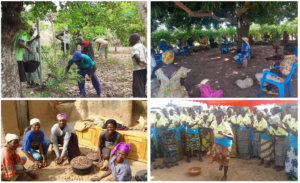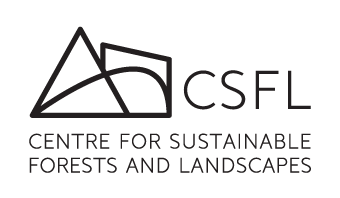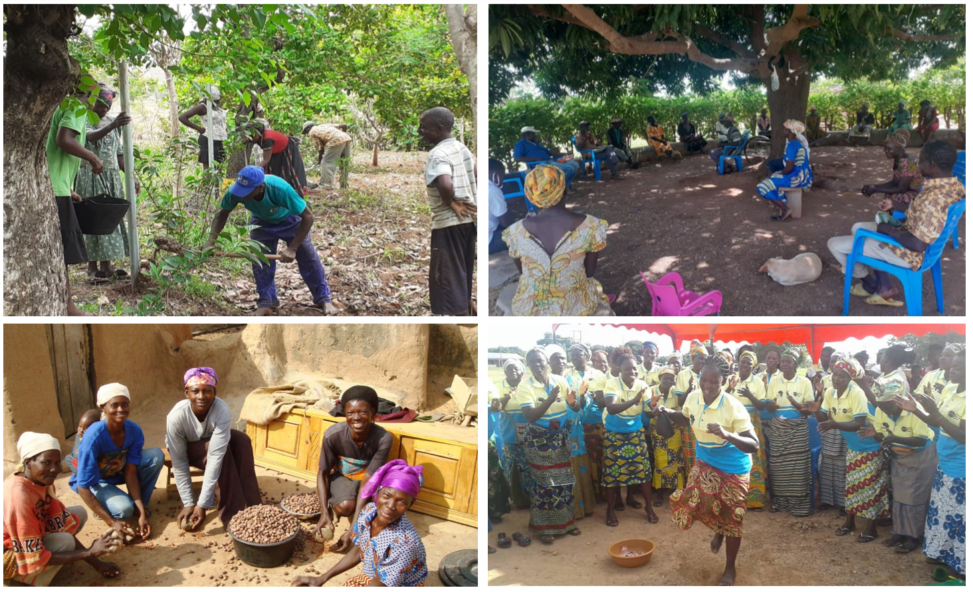Concern for forests, forest peoples and agriculture
Forests and agriculture play pivotal roles in the fight to mitigate and adapt to the global climate crisis. Consequently, research investigating the interfaces between forest and agricultural areas (often referred to as mosaic landscapes), and supporting the smallholder farmers to whom these landscapes are both home and the source of livelihoods, has potentially huge value in achieving several of the sustainable development goals. This research interest is spurred by both moral and material justifications, which are linked to the provision of benefits to communities and forests, respectively. The moral imperative for this research is driven by desire to give voice to the communities who live in these mosaic landscapes and are often underrepresented in local decision-making, vulnerable to larger market perturbations and actors, and disproportionately affected by a climate crisis they have done little to contribute to. In addition, there is a material motivation for pursuing research into forest-farm interfaces caused by the need to protect the world’s ever reducing forests, to which agriculture is a principle threat. Producer organisations (POs) are a potentially fruitful avenue of inquiry and support when pursuing beneficial outcomes at the forest-farm interface.
Producer organisations at the forest and farm interface
Agricultural POs, also commonly referred to as cooperatives, are people-centred forest and farm- based organisations owned, controlled and run by and for their members to realise their common economic, social, and cultural needs and aspirations (International Cooperative Alliance). A long history of research on POs has shown them to be capable of providing a range of economic, social, and environmental benefits to their members. POs create these benefits through several mechanisms, including acting as innovation hubs for new ways of attaining prosperity. Economic benefits are achieved through lowering transaction costs, providing marketing services, and by coordinating aggregation of members’ produce to access higher value markets. Additionally, POs can generate social outcomes by increasing social capital and providing access to a wide variety of social and cultural services such as establishing local savings and loans associations for access to low interest credit (social), or preserving traditional agricultural practices (cultural). Finally, environmental benefits result from promoting reduced use of chemical inputs, encouraging agroecological practices and tree planting among members, and promoting indigenous farming techniques which tend to be more diverse and less demanding of the forest landscape than more intensive techniques. These sectoral benefits are all underscored by PO efforts to improve the integration of organised smallholder farmers with policy makers to create a favourable policy environment for members and the landscapes in which they live.
Case study: Tele-Bere, Ghana
Tele-Bere are a PO based in the North of Ghana and provide their 5000 members with a range of services. Tele-Bere helps establish village savings and loans associations (VSLAs), which allow members to informally access low interest credit lines, overcoming local mistrust in formal banking institutions. VSLAs not only create social and economic benefits, through improved community cohesion and trust, and access to finance respectively, but also provide a platform through which to address environmental issues, providing training on agroecological practices and encouraging farmer-managed natural regeneration of forest-farm landscapes.

Clockwise from top-left, the pictures show 1) integration of local tree species on smallholder farm plots as part of the implementation of agroecological practices; 2) A VSLA meeting to collect dues from members; 3) A share out ceremony for the VSLA, where community loans are given to members; 4) Shea pickers aggregating their produce to take to market. All pictures © Tele-Bere VSL Association.
Challenges for POs
Despite the clear potential of POs such as Tele-Bere to provide benefits for forest-farm communities and landscapes, there remain operational challenges. These challenges include a lack of financial capacity; high dependency on the surrounding political and economic environment, which can often hinder their activities; having to compete with large corporations, which often have far more financial and political capital; unfavourable public policy for POs wanting to enter the market; poor internal FFPO management, preventing democratic and equitable decision making and outcomes; an inability to respond to external shocks, e.g. market crashes and climate change; and a lack of organisational capacity in terms of staff, material resources, and knowledge, preventing progress. To reduce uncertainty and overcome challenges, POs must receive increased volume and variety of support. Research that helps to fill existing PO knowledge gaps is one way of providing such support.
How research can look to support POs
To date, research on POs has been predominantly outcome focussed, asking questions such as ‘what benefits does PO membership provide?’. Whilst empirical evidence showing the social, environmental, and economic outcomes POs deliver is undoubtedly valuable in attaining material support for such organisations, it is possible that shifting research emphasis towards the mechanisms of benefit delivery would create more implementable research outputs. In addition to reconsidering what questions are being asked, it is also important to evaluate how they are answered. Rather than using POs as a case study to evidence a point, it would be beneficial to include the POs in all aspects of the research process, from design, through implementation, to outcome. This collaborative approach to research is called co-production and its benefits are two-fold. Firstly, from an ethical standpoint, the genuine involvement of PO members as residents of forest-farm interfaces at each stage of the research allows the process to be more accountable, representative, and inclusive. Secondly, there are technical benefits to involving POs in PO research, namely that the produced knowledge products are understood by the PO who will be implementing them and, owing to their participation in the research process, reflect and consider the local context, including norms, knowledges and environments, in which the PO is embedded.
Co-producing research for improved forest-farm interfaces
It is clear that POs have the potential to provide positive outcomes for forest-farm landscapes and the people who reside in them. It is also clear that genuinely co-produced research has the potential to improve the delivery of these PO benefits. As such, researchers must look to establish meaningful links with POs and build the trust necessary to engage in genuinely co-productive research. Equally, donor institutions must recognise the need for flexibility in project processes (funding, design, management) when working with what are often small organisations that are deeply embedded in place-specific social relations including traditional leadership, religious groups, and caste systems. The proliferation of co-produced research with POs can contribute to the improvement of benefit delivery, helping to improve the quality of forest-farm landscapes and the lives of the 2 billion smallholder farmers who live in them.
by Jack Covey
PhD Student, School of Geosciences, University of Edinburgh




Leave a Reply